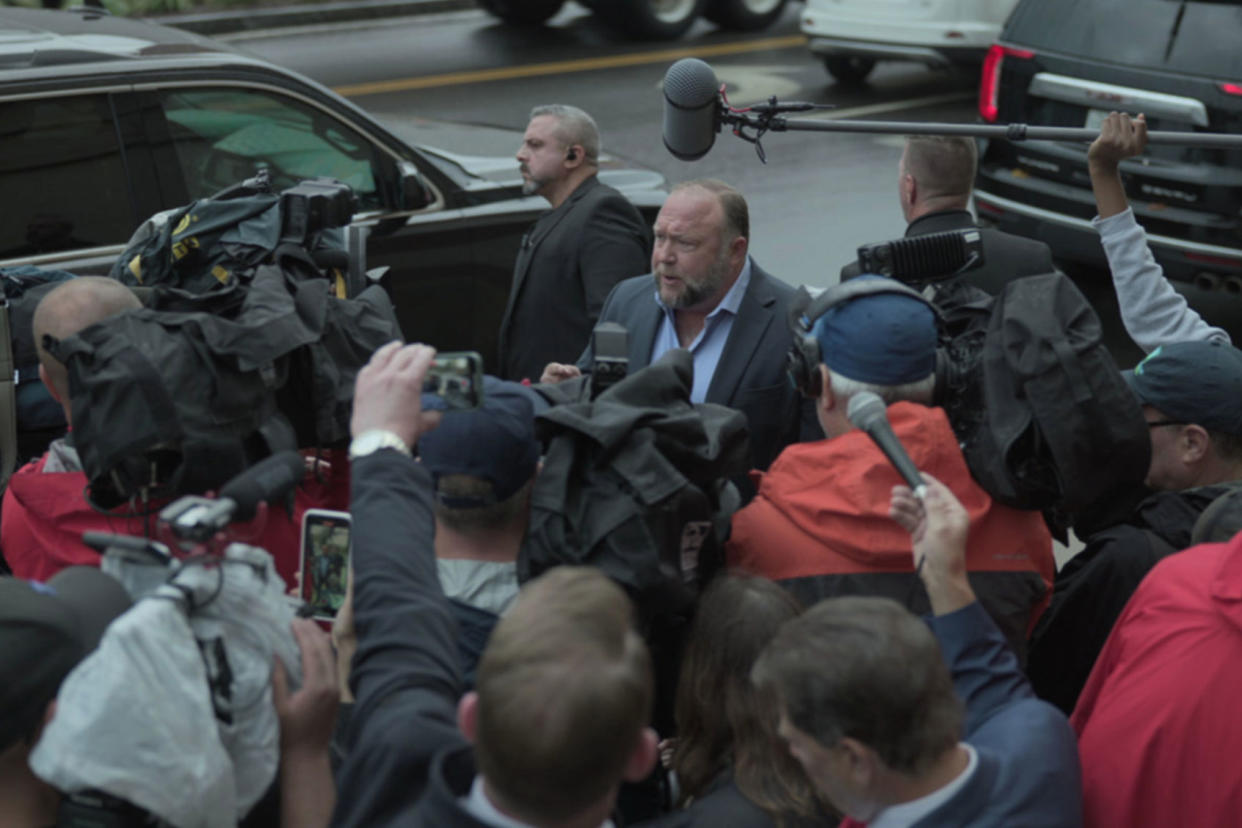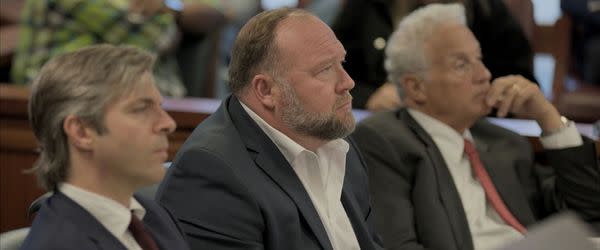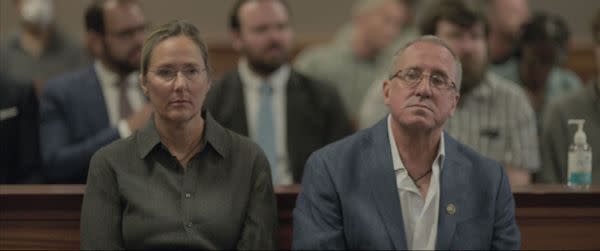In "The Truth Vs. Alex Jones" a historic court win does little to repair the damage done to us all

Some costs can only be fully understood through numbers. In chronicling the two defamation lawsuits brought against Alex Jones and his website, InfoWars, “The Truth vs. Alex Jones” is, in the most basic sense, a story of historic damages.
Nearly $1.5 billion in penalties was awarded to the families of the victims in the Sandy Hook Elementary School shooting by juries in Texas and Connecticut in 2022, rulings that were followed by Jones declaring bankruptcy.
These totals represent the largest defamation award in United States history. As things currently stand, the families haven’t seen a dime, and InfoWars is still spewing out misinformation daily. (This week Jones is recycling an old favorite: antisemitism.) Welcome to the American legal system if indeed this outcome surprises you.
That missive is one of many guiding filmmaker Dan Reed in his methodical survey of what Jones’ shameless and shameful conspiracy grifting has done to these fathers and mothers, to Newtown, Conn., and our democracy.
Some his subjects recite, such as when the families’ lawyer Mark Bankston asks the Texas jury to focus on 24%, since that is the percentage of people in the U.S. who believe that the massacre at Sandy Hook was either definitely or partially staged.
By then we’ve learned that barely two hours passed between the shooting making national news and Jones telling his InfoWars viewers for the first time that the tragedy was a staged operation, a deep-state ruse to justify confiscating guns from private citizens. The day after the shooting he accused one of the grieving parents who made a televised statement on behalf of the families, Robbie Parker, of being a crisis actor. Parker, who was still in shock at losing his six-year-old daughter, nervously smiled before stepping up to a podium full of microphones. Jones and his followers have tortured him ever since.
“They are coming, they are coming, they are coming!” he fulminates in a clip the parents’ legal team plays for him during his 2019 deposition, at which he seems unmoved. The nonexistent “they” he refers to did not come for Second Amendment zealots. Instead, Jones’ followers descended on Newtown, including one he financially backed to harass them at public meetings and their homes. To this day the victims’ parents receive death threats.
That ensures that the count that hits hardest isn’t displayed onscreen or said aloud. Reed makes us feel it instead – the anguish of 15 names of slaughtered children recited in succession, without pause, for 40 seconds.
These were the children whose teachers hid them in a bathroom, thinking they’d be safe, only to be murdered by the monster neither Reed nor Connecticut state police investigator Daniel Jewiss name, aside from referencing an evil that walked through the school’s front door. The strain in Jewiss’ voice all these years later is undeniable.
Compared with Reed’s previous work, which includes “Leaving Neverland” and “Four Hours at the Capitol,” “The Truth vs. Alex Jones” is more sharply targeted and careful not to entirely rely on the audience’s empathy. Remember those numbers: one in four people believe Jones, and he’s right to assume some of them are watching.
That may have informed his more fastidious approach to presenting the scope of Jones’ injury.

Most people know Jones evolved from a fringe cable access nutcase into one of the most influential voices in far-right politics. Reed, though, strategically includes an anecdote from a former producer featuring him warning his audience that corporations were poisoning babies with fluoridated water before the Sandy Hook segment.
How a man who exploited the basic human impulse to protect infants evolved into a pundit who convinced nearly a quarter of all Americans that 20 six- and seven-year-olds weren’t murdered in December 2012 and demonized their parents, can only be explained by greed.
But even here Reed stops short of expanding on a point that one ex-InfoWars employee touches on, which is that he cooks up alleged geopolitical fairy tales and fever dreams to sell supplements. “Did we think he wanted us to lie?” one asks. “Yeah, it was obvious.”
That much any sensible person knows, but Reed could have hammered on that point with more precision. The greater value in “The Truth vs. Alex Jones” rests in scenes where Reed speaks with true believers in the Sandy Hook conspiracy.
Look into the eyes of Kelley Watt, and you can tell she is convinced Lenny Pozner is lying about his child Noah having been shot to death.
She informs Pozner that the only way she’ll believe him is if he agrees to exhume Noah’s body. “I watch a lot of true crime, and they exhume bodies all the time. It’s not unusual,” she blithely says. “That’s all you can do.”
The contemptible cruelty of this thinking, let alone the obscene presumption that Pozner is obligated to prove to her that his child is dead, isn’t even shocking. Rather, it validates suspicions concerning the devotion that Jones’ cult, which shares significant overlap with that of Donald Trump, has to this lie.
Within all this, Reed captures the essence of what makes Jones so darkly compelling, irritating, and dangerous.
The second of the film’s two hours walks the audience through the court cases, spending the preponderance of the runtime in the Austin, Texas courtroom where the InfoWars host does a bang-up job of working Judge Maya Guerra Gamble’s last nerves. When he isn’t mugging for Reed’s camera he vacillates between a stony-faced refusal to admit guilt and an approximation of remorse. You can see that part is false, and you can understand why the other face he wears sells a lot of overpriced snake oil.
When Gamble isn’t reminding him that the courtroom isn’t his show, she’s heroically maintaining her composure when, at various moments, the plaintiff’s legal team presents her with clips of what Jones has said about her or one of the parents on his show mere days before.

And yet, when Scarlett Lewis, the mother of Sandy Hook victim Jesse Lewis, looks into Jones’ eyes from the stand, she shows us why this case has become an indicator of how lost so many people are.
Want a daily wrap-up of all the news and commentary Salon has to offer? Subscribe to our morning newsletter, Crash Course.
“Truth is what we base our reality on. And we have to agree on that to have a civil society,” Lewis says during her testimony.
Sandy Hook is a hard truth, she tells Jones, reminding him that he has children too. “Having a quarter of Americans doubt that Sandy Hook happened or doubt the facts surrounding Sandy Hook is not conducive to keeping our kids safe.”
Yet, she says, “You keep saying it. Why? Why? For money?” Jones pretends to look pained because the true answer is yes.
The civil trials achieved the significant win of getting Jones on record as saying he believes the 2012 shootings “100% happened.” Through “The Truth vs. Alex Jones,” Reed shows us that more than a decade after the fact his saying it in court documents doesn’t matter. Lenny Pozner knows this, and so does Kelley Watt.
Lewis’ courtroom confrontation with Jones occurred not long after Jones called Jesse’s father Neil Heslin “slow” on his show. Still, she says while looking into her tormentor’s eyes, “I know you believe me. And yet, you’re going to leave this courthouse, and you’re going to say it again on your show.”
In response, Jones shakes his head pseudo-passionately.
“You’re saying no. You just did it,” she said. Later, he’ll apologize to Lewis and shake her hand, only to return to his studio and call the court proceedings a sham. That’s what his audience wants to believe, and they’re passionate about it to keep giving him money to lie with little regard for the high price we’ll all pay in the long run.
"The Truth Vs. Alex Jones" premieres Tuesday, March 26 at 9 p.m. on HBO and Max.
